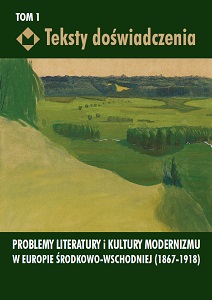Konfrontacje. O twórczości Antuna Gustava Matoša
Confrontations. Regarding the works of Antun Gustav Matoš
Author(s): Małgorzata Vrazić
Subject(s): Cultural history, Studies of Literature, Theory of Literature
Published by: Wydawnictwa Uniwersytetu Warszawskiego
Keywords: modernism; paradigms of Slavic modernism; Croatian culture at the end of the 19th and the beginning of the 20th century; travelling; role of travelling in creating culture; provinciality
Summary/Abstract: The text is about the works of the leading Croatian modernist. The role Matoš played in Croatian culture allows us to compare him to such artists as for example Stanisław Przybyszewski. However, we have to remember that they represented different artistic tempers and we have to place them on the opposite sides of modernism. Matoš was a poet of the form, which he considered to be the bastion of authenticity. He was also a rationalist. He knew the works of Przybyszewski, but he was very critical about them (among other things he criticised Przybyszewski’s modernist tendency to use exaggeration and „formal” licentiousness). In spite of that, Przybyszewski, as a Slavic modernist renowned in Europe, was certainly a reference point for Matoš. In his works there are also many Polish themes, as he was interested in Polish culture and politiics. He thought Polish people are most similar to Croats of all the Slavic nations. Without a doubt Matoš is a symbol of artistic Zagreb, but his artistic personality was actually shaped far from that city, during a long process of confrontation with the art of Europe, mainy France. At the beginning, after he deserted the Imperial army, he had no choice but to travel around Europe. He became the artist of the road and that experience influenced his way of looking at problems of Croatian culture at the end of the 19th and the beginning of the 20th century. For Matoš travelling was the ‘poetry of the modern age’ and the best way to overcome his own provinciality, to enrich his national resources mentally and intellectually and to make up for his numerous cultural shortcomings. It was an important factor in creating his national and cultural identity. The text presents various aspects of the confrontational attitude that was so typical for the poet.
Book: Teksty doświadczenia. Tom 1
- Page Range: 425-440
- Page Count: 16
- Publication Year: 2017
- Language: Polish
- Content File-PDF

